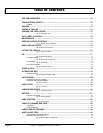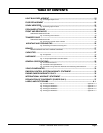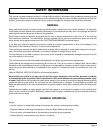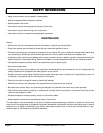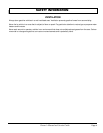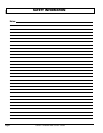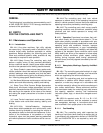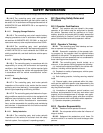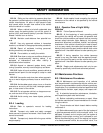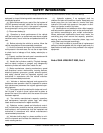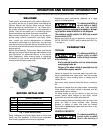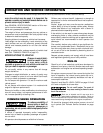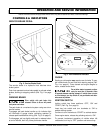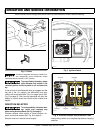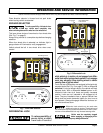
SAFETY INFORMATION
Page xii
Owner’s Manual and Service Guide
Read all of manual to become thoroughly familiar with this vehicle. Pay particular attention to all Notes, Cautions and Warnings
B.1.1.4.2 The controlling party shall supervise the
handling of liquefied petroleum gas fuels (when used) to
be certain it is in accordance with appropriate sections of
ANSI/NFPA 505 and ANSI/NFPA 58 or as required by
local ordinance.
B.1.1.5 Charging Storage Batteries
B.1.1.5.1 The controlling party shall require battery-
charging procedures to be in accordance with appropri-
ate sections of ANSI/NFPA 505, ISO 3691, or local ordi-
nance and meet any other requirements such as OSHA.
B.1.1.5.2 The controlling party shall periodically
review procedures to be certain that appropriate sections
of ANSI/ NFPA 505 or local ordinance and OSHA are
strictly complied with, and shall familiarize vehicle opera-
tors with it.
B.1.1.6 Lighting For Operating Areas
B.1.1.6.1 The controlling party, in accordance with his
responsibility to survey the environment and operating
conditions, shall determine if the vehicle requires lights
and, if so, shall equip the vehicle with appropriate lights
in accordance with the vehicle manufacturer's recom-
mendations.
B.1.1.7 Warning Device(s)
B.1.1.7.1 The controlling party shall make periodic
inspections of the vehicle to be certain that the sound-
producing and visual device(s), if so equipped, are main-
tained in good operating conditioning condition.
B.1.1.7.2 The controlling party shall determine if oper-
ating conditions require the vehicle to be equipped with
additional sound-producing and/or visual devices com-
patible with the vehicle manufacturer's recommenda-
tions, and be responsible for providing and maintaining
such devices, in accordance with the vehicle manufac-
turer's recommendations.
B.1.1.8 Safety Interlocks
B.1.1.8.1 The controlling party shall make periodic
inspections of the vehicle to be certain that the safety
interlock system, if so equipped, is operating properly.
B.2 Operating Safety Rules and
Practices
B.2.1 Operator Qualifications
B.2.1.1 Only persons who are trained in the proper
operation of the vehicle shall be authorized to operate
the vehicle. Operators shall be qualified as to visual,
auditory, physical, and mental ability to safely operate the
vehicle according to Section 5 and all other applicable
parts of this document and vehicle operator's manual.
B.2.2 Operator’s Training
B.2.2.1 The controlling party shall develop and con-
duct an operator training program.
B.2.2.2 Successful completion of the operator train-
ing program by the operator shall be required before
operation of the vehicle. The program shall be presented
in its entirety to all new operators and not condensed for
those claiming previous experience.
B.2.2.3 The controlling party should include, as a
minimum, in the operator training program the following:
(a) Instructional material provided by the vehicle man-
ufacturer, including vehicle operator's manual.
(b) Emphasis on safety of passengers, vehicle opera-
tor, and other persons.
(c) Safe loading practice, including securing material
loads.
(d) General safety rules contained within this docu-
ment and the additional specific rules determined by the
controlling party in accordance with this document, and
why they were formulated.
(e) Introduction of equipment, control locations, and
functions, and explanation of how they work when used
properly and the consequences of improper use; expla-
nation of surface conditions, grade, and other conditions
of the environment which could affect vehicle operation.
(f) Operator competency evaluations.
B.2.3 Operator Responsibility
B.2.3.1 Read and follow operator's manual.
B.2.3.2 Do not operate vehicle under the influence of
drugs or alcohol.
B.2.3.3 Safeguard the pedestrians at all times. Do
not drive vehicle in a manner that could endanger other
persons.



